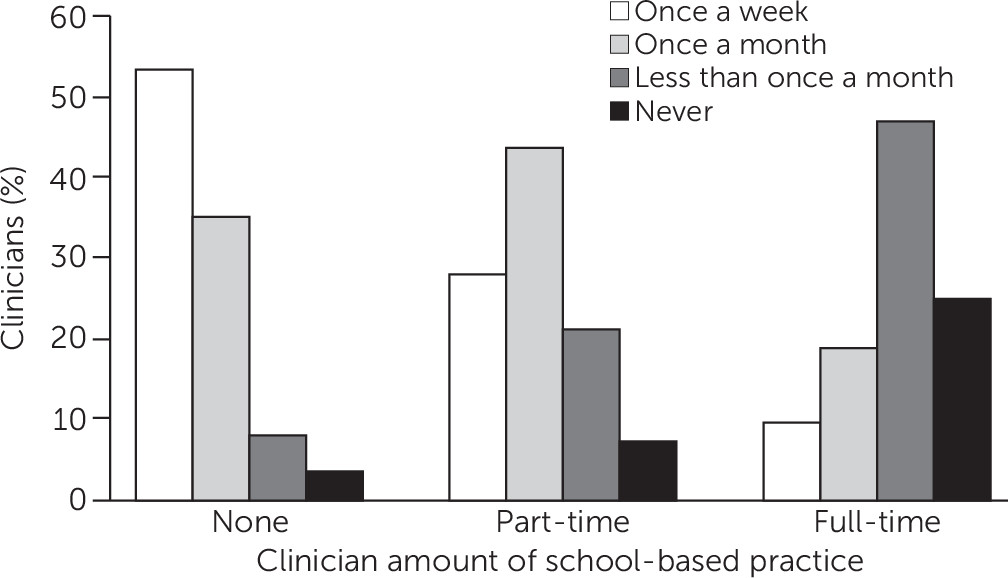Research suggests caregiver involvement may be important for improving child mental health outcomes, with such involvement linked to greater improvements during psychotherapy (
1,
2). Multiple randomized controlled trials and meta-analyses have demonstrated that child-only psychotherapy plus caregiver involvement was more effective than child-only psychotherapy alone across many intervention types (e.g., cognitive-behavioral therapy [CBT], nonmanualized usual care) (
1,
2). A recent randomized controlled trial found that usual care plus caregiver involvement was linked to greater simultaneous declines of symptoms in multiple behavior domains than usual care without caregiver involvement (
2). Similarly, a meta-analysis with 48 studies showed that caregiver involvement adds extra benefit to child-only treatment, a finding with a moderate effect size (
1). Because of this increasing evidence base, there has been an emphasis on strategies to increase caregiver involvement and engagement (
3).
Whereas the past few decades have shown major developments in evidence-based practices for youths with mental health conditions, such practices are not consistently available in settings where most youths are served (
4). Schools are one of the most common settings for mental health interventions for youths (
5); these settings offer an avenue for increasing the reach of mental health services for youths who might not otherwise receive care by meeting them “where they are” (
6,
7). Schools may disproportionately facilitate access for traditionally underserved populations, such as racially and ethnically diverse youths, compared with community mental health (CMH) settings (
5,
8,
9). Youths are more likely to initiate and follow through with treatment delivered in a school rather than in a community setting, possibly because of ease of access and potential for less stigmatization (
9). Schools may also make it easier for youths to seek confidential services without caregiver involvement. Additionally, schools are one of the main settings where youth impairments are detectable, offering a unique view into the mental health needs of children and adolescents (
10). Because of the numerous and unique benefits offered by school-based care, calls continue for greater integration of mental health services within schools (
6,
11).
Although schools provide an excellent avenue for youth access (
7), anecdotal evidence indicates that involving caregivers in school-based mental health services seems to be a challenge (
5). Most of the literature examining caregiver involvement in school-based care, however, has focused on treatment for a specific disorder in a small age range (e.g., social anxiety disorder in high school students) (
12), thus limiting ability to generalize the findings. Studies of caregiver involvement have been narrow in sample characteristics (e.g., age, diagnosis) and treatment modality (e.g., multisystemic therapy), leaving a gap in the research and highlighting the need for a broad, generalizable sample of caregiver involvement in school-based care. In this article, we provide empirical data on caregiver involvement, stratified by service setting, to better inform our understanding of how clinician embeddedness in schools may relate to involvement of the clients’ caregivers in therapy. We have extended the literature by using a retrospective survey to evaluate clinicians’ contact with clients’ caregivers in school-based care. The study included a large, representative sample of clinicians across Washington State, who were part of a state-funded evidence-based practice training initiative in youth CMH (
13).
Methods
All participants were clinicians who were part of the Washington State-funded training initiative for evidence-based practices in CMH. The initiative, called CBT+, provides mental health clinicians who serve youths in public settings with in-person training and expert consultation on CBT for anxiety and depression, trauma-focused CBT (TF-CBT), and parent management training (PMT). Participants (N=215) attended a 3-day in-person training, followed by twice-monthly group-based telephone and/or video expert consultation for 6 months. Participants received certificates of completion if they completed electronic surveys before the in-person training and after participating in the expert consultation, attended the 3-day training session, entered data online for cases in which they applied the CBT+ training (for consultant review), and participated in nine of 12 consultation calls. Although no survey incentives were provided, participants received reminders to complete the surveys, and completing the surveys was required to receive the CBT+ certificate.
Data for this study came from the pretraining and postconsultation surveys collected from September 2017 through October 2018. Participants provided demographic and background information in the pretraining survey. The survey offered after the consultation was used to collect information to evaluate the initiative (e.g., clinician self-rated CBT skill and feedback on the training and consultation) and to determine clinicians’ amount of school-based practice (none, part-, or full-time) and frequency of in-person contact with their clients’ caregivers. Caregiver contact was measured by three self-report items. Clinicians were asked whether they were in contact with caregivers (yes or no). If clinicians selected “yes,” they were asked about the frequency of in-person contact and given four options: “never,” “less than monthly,” “once a month,” or “once a week.” Clinicians who answered “no” to being in contact with caregivers were coded as never having contact with caregivers. All participants (N=215) completed the pretraining survey, and 82.3% (N=177) completed the postconsultation survey, yielding a final sample of 177 clinicians. All study activities were reviewed by the institutional review board of the University of Washington and were determined to be exempt from review.
We conducted the analyses by using SPSS 19, and we performed descriptive analyses of clinician demographic characteristics. We used chi-square tests to assess associations between clinicians’ amount of school-based practice (none, part-, or full-time) and contact with youths’ caregivers.
Results
Participants were predominantly female (88%, N=151) and Caucasian (70%, N=120), with smaller numbers of African-American (6%, N=11), Hispanic or Latino (8%, N=14), Asian (3%, N=5), American Indian or Alaska Native (0.6%, N=1), Native Hawaiian or other Pacific Islander (1%, N=2), or multiracial (7%, N=12) participants. On average, participants were 34.92±10.62 years old with 3.62±4.25 years of experience providing psychotherapy.
About half the clinicians did not work in schools (e.g., CMH clinics; 50%, N=88); the remaining worked either part- (32%, N=57) or full-time (18%, N=32) in schools. Amount of school-based practice was related to having any contact with their clients’ caregivers (N=177, χ2=14.57, df=2, p=0.001); clinicians who reported any school-based practice were less likely than clinicians who did not work in schools to have any type of contact with caregivers. Full-time school-based clinicians were less likely to have any type of caregiver contact than part-time school-based clinicians (N=89, χ2=5.67, df=1, p=0.017).
Amount of school-based practice was also related to the frequency of in-person contact with clients’ caregivers (N=177, χ
2=49.58, df=6, p<0.001). Clinicians who reported any school-based practice were less likely than clinicians who did not work in schools to have frequent in-person contact with caregivers (
Figure 1). Full-time school-based clinicians were even less likely than part-time school-based clinicians to have frequent in-person contact with caregivers (N=89, χ
2=16.49, df=3, p=0.001). In our sample, full-time school-based clinicians were the most likely to have less than monthly contact with caregivers: 72% (N=23) reported less than monthly contact or never having contact with caregivers. In contrast, 53% (N=47) of non-school-based clinicians reported weekly contact with caregivers (
Figure 1).
Discussion
Integration of mental health care into schools is becomingly increasingly common and promoted. To our knowledge, these findings provide some of the first empirical evidence of the often-referenced challenge of involving clients’ caregivers in school-based treatment. Our findings suggest strikingly lower rates of caregiver contact when clinicians are based in schools rather than in other community settings, and a marked difference in the amount of caregiver-clinician contact between clinicians who work part- or full-time in schools. These findings have implications for the types of evidence-based practices schools may choose to implement. For interventions that require high levels of caregiver involvement (e.g., PMT, TF-CBT), school-based delivery may require the use of caregiver engagement strategies or augmentation of school-based services with in-home services to address low caregiver involvement (
3,
10,
14). Because the surveys did not assess to what degree the clinicians attempted to engage caregivers, it remains unknown whether the participants were unsuccessful in trying to reach caregivers or whether they were focused only on individual treatment of the youths. Challenges with caregiver contact must be considered alongside the significant and unique benefits of school-based mental health services.
Low clinician involvement with clients’ caregivers in school-based mental health care may result from varied reasons, including limited transportation, inflexible caregiver schedules, perceived stigma, or youths providing their own informed consent for services, which is permissible beginning at age 13 years in Washington (
9,
10). Clinicians in nonschool settings may have more caregiver contact because caregiver facilitation of treatment is a necessary prerequisite to treat younger children in such settings (e.g., providing transportation for the child, insurance, and scheduling of appointments). Because school-based treatment does not require caregiver facilitation (
5,
9), the amount of caregiver involvement needed for youths to receive treatment is lower than in community-based care, which may result in less contact between caregivers and clinicians. Furthermore, youths whose caregivers have been unable or unwilling to facilitate treatment in a community and/or nonschool setting may be more likely to receive treatment in school or may not receive treatment at all (
9). Barriers may also emerge from the workload demands of school-based clinicians, which may limit clinicians’ time and resources to engage caregivers in treatment (
7). Finally, in some cases, youths ages 13 and older may intentionally seek school-based care that is independent of their caregivers to ensure confidentiality (e.g., for issues of older adolescence, persistent invalidation by caregivers of youths’ status as LGBTQ+, or abuse).
These findings should be considered within the context of study limitations. Notably, these analyses compare the frequency of caregiver contact across clinical settings: they do not offer information on the quality of contact with caregivers (e.g., a quick exchange versus an in-depth update) nor do they account for potential differences in the frequency of child-clinician therapy sessions by service setting. Further, we could not determine whether any selection bias was caused by the service setting and whether any selection (or self-selection) variables interacted with clinician-caregiver contact. For example, although schools facilitate access to care for ethnically and racially diverse youths (
5,
8,
9), research suggests that such individuals may be disproportionately hesitant to engage with institutional systems, including schools and health care entities (
15). It is possible that youths who already have lower rates of caregiver involvement are more likely to be served in schools (
9). Additionally, data on caregiver contact were collected through clinicians’ retrospective self-report of general communication patterns with their clients and may have been subject to self-report biases. Clinicians were asked to report their communication patterns in aggregate; they were not instructed to report on specific clients or by the treatment approach used. In addition, the age range of the children reported on by the clinicians was presumably broad, which may have affected the conclusions drawn (e.g., adolescents require less caregiver facilitation and can legally seek out their own services).
Conclusions
These results provide some of the first empirical evidence of the challenge of lower clinician involvement with clients’ caregivers when youth mental health services are provided in schools instead of in other community settings. Although research suggests that caregiver involvement in treatment is important, schools enhance access to services for youths who may otherwise not have access (
5,
8,
9) and increase treatment completion rates (
9). More attention to clinicians’ contact with and strategies to engage caregivers in school-based mental health care is needed (
3). Understanding how caregiver contact and engagement vary by treatment target and youth characteristics (e.g., age, motivation), as well as testing the effectiveness of engagement strategies, would help inform efforts to improve the quality of care delivered in schools.
Acknowledgments
The authors acknowledge the Washington State Division of Behavioral Health and Recovery (WA DBHR) for funding the CBT+ initiative and for being supportive of this research partnership.


